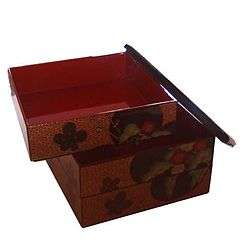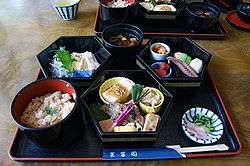Japanese

重箱 (jūbako, rare reading: kasanebako): square jūbako with lid.

重箱 (jūbako, rare reading: kasanebako): hexagonal jūbako used to serve food.
Pronunciation
Noun
重箱 (hiragana かさねばこ, romaji kasanebako)
- (rare) tiered boxes for holding and presenting food, such as 弁当 (bentō, “bento”) or New Year's お節 (osechi, special dishes usually only served at the new year)
Etymology 2
Origin less clear. Chinese-derived on'yomi 重 (jū, “to stack”) + Old Japanese 箱 (hako, “box”). The hako changes to bako as an instance of rendaku (連濁).
This is the standard reading for this term.
Pronunciation
Noun
重箱 (hiragana じゅうばこ, romaji jūbako, historical hiragana ぢゆうばこ)
- tiered boxes for holding and presenting food, such as 弁当 (bentō, “bento”) or New Year's お節 (osechi, special dishes usually only served at the new year)
- These are traditionally made of wood and often lacquered, coming in sets designed to stack two, three, or even more layers high. Often square, jūbako may also come in different shapes. A set usually comes with a lid for the top layer.
Idioms
Idioms
- 重箱で味噌を擂る (jūbako de miso o suru): “grind miso in a jūbako” → don't sweat the small stuff; excellent appearance, but inappropriate to the task at hand
- 重箱に鍋蓋 (jūbako ni nabebuta): “a pot-lid on a jūbako” → a square peg into a round hole
- 重箱に煮染め (jūbako ni nishime): “boiled stew in a jūbako” → looks great on the outside, not so good on the inside: appearances can be deceiving
- 重箱の隅を杓子で払え (jūbako no sumi o shakushi de harae): “clear out the corners of a jūbako with a ladle” → to see the forest for the trees, don't sweat the small stuff
- 重箱の隅を楊枝でほじくる (jūbako no sumi o yōji de hojikuru): “to pick out the corners of a jūbako with a toothpick” → to split hairs
- 重箱を擂り粉木で洗う (jūbako o surikogi de arau): “clean a jūbako with a pestle” → see the forest for the trees, don't sweat the small stuff
|
Derived terms
Derived terms
- 重箱読み (じゅうばこよみ): A reading of a kanji compound, consisting of an on'yomi for the first kanji and a kun'yomi for the second kanji.
- 重箱面 (じゅうばこづら): a square face
|
References
-
↑ 2006, 大辞林 (Daijirin), Third Edition (in Japanese), Tōkyō: Sanseidō, ISBN 4-385-13905-9

